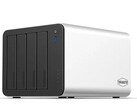CheckMag | Data hoarders, here are the best free Docker containers to help you access, store and organise every type of media

Whether you run an off the shelf NAS, or build your own, Docker can be installed on almost anything, and will allow you to build libraries of media that can be accessed from any web browser connected to your home network. Here are some of the best free containers to help you get started with the most common types of media.
Immich
Immich is one of those pieces of software that is so good, it has no right being free. Unlike 'free' where you become the product, Immich mimic's Google Photos but is completely self-hosted.
In addition to the native iOS and Android apps, which will let you automatically back up your phone camera roll every time you connect to your home Wi-Fi, as well as browse your photo library, Immich automatically organises all your photos and videos into a timeline, and plots where they were taken onto an interactive map.
Pictures can still be uploaded through the web interface (for those that still use a digital camera), and automated facial recognition and keyword searching help you find specific photos in what will likely be a massive library. There is even an Andoid TV app where you can set your Immich library as a screensaver.
While Immich is completely free, with no feature limitations, I find the $25 for a single user lifetime purchase well worth the price for supporting the project.
Navidrome
Navidrome is a web based music player and browser. It supports most features you'd expect from an MP3 player, including favourites, playlists, ratings, album art and randomization. It also supports curating online radio stations.
Navidrome is not a library management tool. There is no way to edit the metadata of individual files, it will only organise a collection into albums and artists, unlike iTunes on Mac or Rhythmbox on Linux. Therefore, Navidrome does require your library to be correctly tagged.
If you want to modify the metadata and manage your library, you can also self-host MusicBrainz Picard and have it access and edit the same files, giving you a pleasant cross-platform listening experience, as well as the ability to manage your library.
Booklore
Booklore lets you host and manage your own e-book library. It supports all the major book formats and will download metadata automatically to populate cover art and get synopses of books. Books can be categorised according to shelves you create yourself, and different users can be set up with access to different libraries. You can import an unlimited about of books at the initial setup, or import directly through the web interface.
Booklore isn't just a book manager, the built-in reading functionality will turn any web browser into a platform-agnostic e-reader. While books can be downloaded or even emailed to your device of choice, using the built-in reader also keeps track of your reading statistics, letting you know what you've read, are currently reading, who your favourite authors are, what genres you read most, your reading patterns and a great deal more.
Jellyfin
Plex used to be the go-to platform for self-hosting your own content. However, over the years the product has seen a steady decline in quality.
Jellyfin aimed to address the self-hosted concerns among Plex users by going back to what Plex was at the start. A truly self-hosted platform where the user is in control of their data.
Just like Plex, you can build your own library of media and Jellyfin will automatically download metadata showing an overview of the TV show or movie, IMDB and Rotten Tomato ratings, cast overviews and credits. It has native iOS and Android apps for accessing your content, as well as access through a web browser.
Jellyfin can transcode multiple streams at once (as long as your hardware supports it), enabling different people to watch different content at the same time.
ROMM
ROMM is a way to organise and play all your retro games through a web browser. ROMM will scrape metadata for all your games from various sources, displaying screenshots, gameplay videos and synopses.
Almost all retro consoles up to PS1 can be played in a browser. Game pads work, both with PC's and mobile devices. You can even use touch screen controls as a last resort. Save states are supported, and as long as you are logged in to ROMM with the same account, you can pick up a different device and carry on playing where you left off.
ROMM supports almost every console in existence and can even be accessed from Tinfoil, giving users a way to manage Switch games on a modified console.
Honorable Mentions
This is by no means an extensive list, but covers some of the most common media types and the best docker containers that support them. However, you might consider PinePods for managing your podcast needs, Audiobookshelf for audiobooks, or tdarr for compressing and reducing the file size of your extensive media collection. You can even host Steam in a container if you want to manage your PC games.
If you're looking for a NAS that will happily support a number of high performance containers, you might want to consider this Intel i3 based UGREEN DXP6800 NAS that is currently seeing a 15% discount on Amazon.














